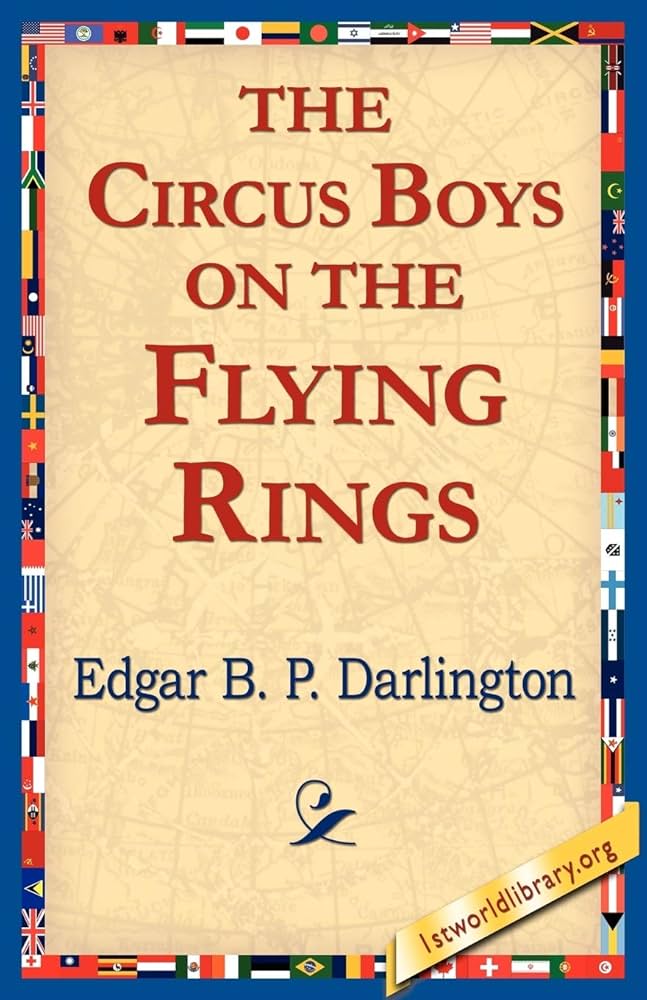Chapter XIX — The circus boys on the flying Rings
byChapter XIX opens with rising tension and a stormy mood, as James Sparling fumes over Phil Forrest’s recent mishap. But rather than dwelling on the seriousness, the story quickly shifts tone and focus to Teddy Tucker. Teddy, ever the source of comic relief, unwittingly sets the stage for one of the most entertaining scenes in the circus’s season. His impromptu partnership with Jumbo, a stubborn trick mule, blossoms into chaotic brilliance. While the mule was supposed to perform solo, Teddy’s spontaneous decision to ride it changes everything. He mounts the animal with no saddle, only a girth strap and reins, drawing chuckles from fellow performers. Everyone expects a brief, harmless spectacle—until a mischievous clown uses a pin to provoke Jumbo. That single act launches the mule, and Teddy, into a dizzying performance that blurs the line between disaster and comedy.
Jumbo bolts through the arena curtain like a freight train, with Teddy hanging on for dear life. What was intended to be a routine gag turns into an unscripted masterpiece of physical comedy. The audience is caught off guard by the unpredictable display, laughter erupting as Teddy flails and the mule bucks across the ring. Every move is wild and spontaneous, making the act feel more alive than anything planned. Mr. Sparling, at first alarmed, watches the chaos unfold with reluctant admiration. Though the show had veered far from the script, it holds the crowd spellbound. Even the ringmaster, initially shouting commands to stop the act, finds himself swept up in the hilarity. The spontaneity of the moment—its messiness, its charm—is what makes the performance unforgettable.
Teddy’s hat is the first casualty, kicked clean off by one of Jumbo’s high-flying legs. Then come the paper hoops, which Teddy crashes through head-first like a clumsy cannonball. Each mishap is greeted by more roars of laughter, turning potential embarrassment into comedic triumph. Performers on the sidelines, trying not to break character, are barely able to stifle their laughter. Teddy, though clearly not in control, somehow manages to stay on, twisting and ducking like a ragdoll in a windstorm. The mule continues to misbehave, jumping, skidding, and turning tight circles that make Teddy’s movements even more exaggerated. This isn’t just a circus show anymore—it’s a spectacle that captures everything the audience came to see: excitement, danger, humor, and unpredictability.
As the climax approaches, Jumbo decides he’s had enough. With a powerful buck, the mule launches Teddy high into the air, an unscripted aerial finale that brings gasps and laughter all at once. Teddy lands awkwardly among the circus band, sending cymbals crashing and instruments flying. The band scatters, music forgotten in the chaos, but the crowd erupts in cheers. Mr. Sparling, now grinning ear to ear, sees what the audience sees: a golden moment of comic brilliance. Teddy has unwittingly become a star, his tumble and tenacity cementing his place in circus lore. What began as a fluke is now a highlight, destined to be retold in town after town.
This chapter captures something essential about circus life—the magic of the unexpected. Plans may be carefully laid, but it’s often the surprises that win the loudest applause. The camaraderie between performers allows space for these moments, where mistakes become memories and chaos breeds connection. Teddy, though bruised and breathless, earns more than laughter—he earns respect. He’s shown he can take a tumble and still rise with a smile. That resilience, that ability to turn misfortune into delight, defines a true performer. Jumbo may have stolen the scene, but it’s Teddy who walks away with the spotlight, even if he’s limping slightly.
Moments like these elevate the story beyond spectacle, adding emotional weight beneath the laughter. Teddy’s unplanned success reminds readers of how vulnerability and humor often go hand in hand. While the audience leaves with sore cheeks from smiling, Teddy leaves with something deeper: confidence. Not the kind earned by perfection, but the kind earned by being real and fearless in the face of absurdity. That’s the heart of performance—the willingness to stumble forward and still hear the crowd cheer.

